A place for everything, and everything in its place.
A Totally-Not-Boring Blog About Storage
How to Store Instruments in Self-Storage
Table of Contents
- Clean your instruments before putting them in storage
- Wrap and cover larger instruments
- Keep off the floor
- Choose the right type of storage for your instruments
- Store instruments in their original cases
- Check for damages often
- Storing acoustic guitars
- Storing woodwind instruments
- Storing stringed instruments
- Storing drum sets and pianos
- Storing brass instruments
- Consider insurance for your stored instruments
- Store your musical instruments with Storwell
- FAQs
- Where should musical instruments be stored?
- Do I have to keep my instrument in its case?
- Do I need insurance for my musical instruments in storage?
- What size storage unit do I need for instrument storage?
- Where can I find a self-storage unit for my musical instrument?
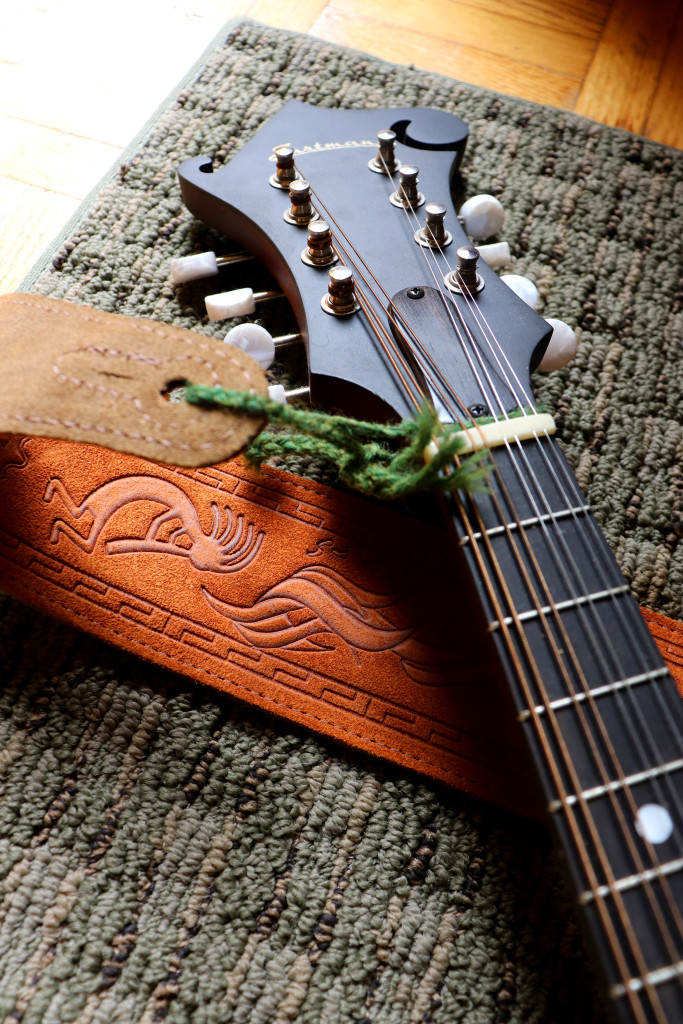
There is nothing more important to a musician than their instrument. Jimi Hendrix’s Fender Stratocaster, Ray Charles’ grand piano, and Yo-Yo Ma’s cello are all priceless musical instruments. While we can’t all be virtuosos like those musicians, that doesn’t mean that our instruments shouldn’t be properly taken care off when not in use.
Musical instruments are expensive and can last a lifetime if they’re taken care of well and stored properly. There are a number of reasons that you may need to store an instrument. For example, you may want to set aside an instrument that you plan to pass on to your children. Another reason to look into instrument storage is if you’re a member of a band and have to deal with a lot of different instruments and gear.

Self-storage is an excellent option for musicians who find themselves with more gear than they have room. Whether it’s a few extra guitars or instruments for a full band, there’s a storage unit that’s right for you. If you are a musician in the GTA, renting a self-storage in Mississauga, Etobicoke, or Scarborough is a great way to keep your instruments in good condition. Whatever your reason to need to store an instrument, it’s important that you store it in the right location and in the correct manner. A few easy tips can help you know how and where to store musical instruments safely.
Clean your instruments before putting them in storage
Before you put your instrument into storage, clean it thoroughly. For flutes that have padded keys, place tissue paper between the pads as this will help prevent the keys from sticking. Place all the pieces of your instrument in the original case. Using a sheet of acid free paper or cloth will help to keep them safe. Be sure to use the right tools and avoid using household cleaners, which can be very damaging. Be sure to release the tension on strings before storing stringed instruments. Doing so will prevent them from snapping or causing damage to the neck. Mouthpieces, reeds, or straps need to be detached and packed with care.

Wrap and cover larger instruments
Cover larger instruments, such as drums and pianos, with a sheet to protect them from dust. Pianos should be kept off the floor if possible. You can use casters or wooden pallets to lift the piano off of the concrete to avoid any moisture damage. Wrap the legs, peddles and bench of a piano and never stack any other items on top. For drums, consider loosening the skins, as this will keep them from stretching and the need for replacement.
Keep off the floor
Whatever space you choose for musical instrument storage, you should keep instruments off the floor if possible because the greatest fluctuations of temperature frequently take place there. Increases and drops in temperature can cause expansions and contractions that are potentially harmful to instruments. Arranging for shelving may be helpful because it allows you to store your instruments on flat surfaces and off the ground. If you have several guitars or stringed instruments, you can set up a wall space from which to hang your instruments. Avoid leaning instruments against the wall because they are likely to fall over and be damaged. Instruments should be kept out of drafts and doorways, and the best place to keep them is the middle of the room where they will be farthest from temperature changes.
Choose the right type of storage for your instruments
Storage units that are able to control for humidity are a great option for storing instruments. Musical instruments are sensitive to temperature changes and humidity. Amplifiers and other electronic equipment also require the same storage solution. Storage units that maintain a consistent temperature, will help instruments from being damaged from moisture or temperature fluctuations. Musical instruments are sensitive to drastic temperature changes, high humidity, and prolonged exposure to heat and cold. Those conditions can have drastic effects on your musical instruments, such as going out of tune, growing mold or mildew, or even severe structural issues like warping or cracking.
Store instruments in their original cases
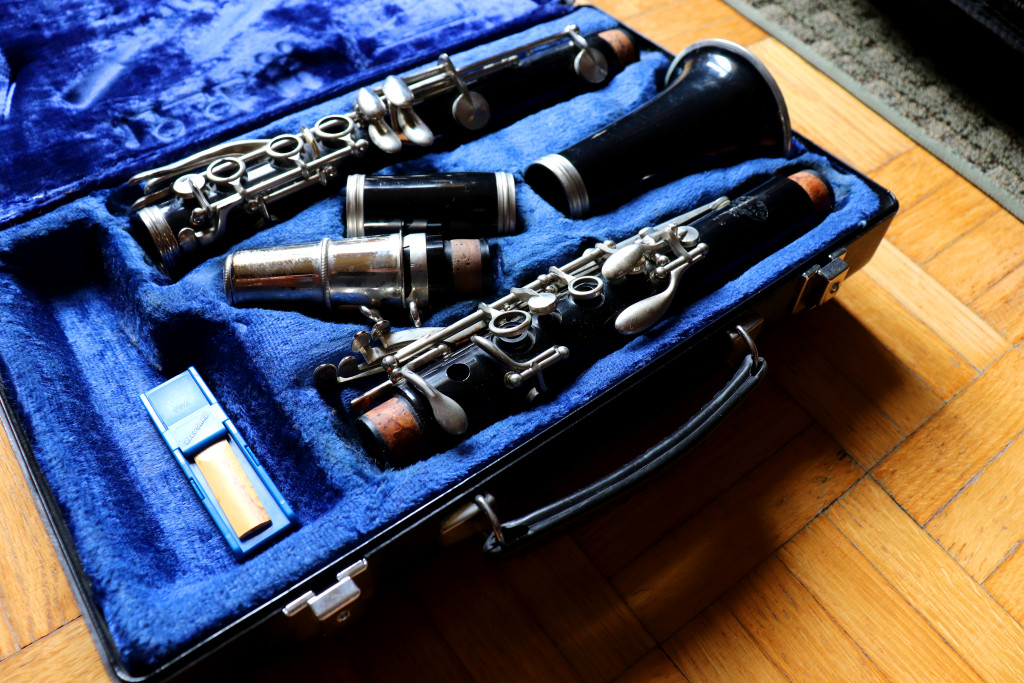
Musical instruments are expensive items. Storing them in their original case or box will help maintain their value. If you do not have the original box, consider purchasing one from a music store. Many instrument cases are lined and designed to fit the instrument precisely. This protects each piece from getting scratched or damaged.
Depending on how long you plan on storing your instrument, it’s a good idea to purchase a hard case. If you plan on taking it out of storage regularly, a soft case might suffice. But keep in mind that if you’re hauling instruments in your vehicle on a daily basis, a hard case will give you a little extra protection. Hard cases don’t just help avoid physical damage; they can protect your instrument from harmful UV lights and keep insects out. While most hard cases include some kind of padding inside, it might be a good idea to layer acid-free paper in between the instrument and the case, just in case any kind of dust or dirt has settled inside the case. This will help preserve your instrument and keep it free of scratches or residue from the case.
Check for damages often
You should check your instruments from time to time to make sure they remain undamaged and are still in good working order. Wood instruments, in particular, should be checked for damages regularly. Wood instruments are very susceptible to temperature changes and humidity. A climate controlled storage unit is highly recommended when storing wood instruments. Wood instruments, even in hard cases, should also be checked for damage from insects. This typically looks like wormholes. In general, keep an eye out for discolouration, mold, warping, corrosion, and cracked joints. If you see any signs of the above damage, take your instrument to a professional repair shop immediately. Leaving them in storage could make the problem worse and end up costing you even more money to fix. You should also take out your instrument and play it occasionally.
Storing acoustic guitars
You should store your acoustic guitar in their cases and leave them standing up, not on their side, this helps prevent warping. It’s important to keep your guitar dry and safe from potential weather damage. You can help control the temperature that the guitar reaches by keeping it close to the center of your unit, away from walls or openings. Keeping it in its case and covered will also help regulate its temperature. Make sure that your strings aren’t strung too tightly to your guitar. Tension placed on the guitar’s neck is a key component to storing your instrument. Don’t keep the strings completely loose, but do unwind some of them to help release tension.
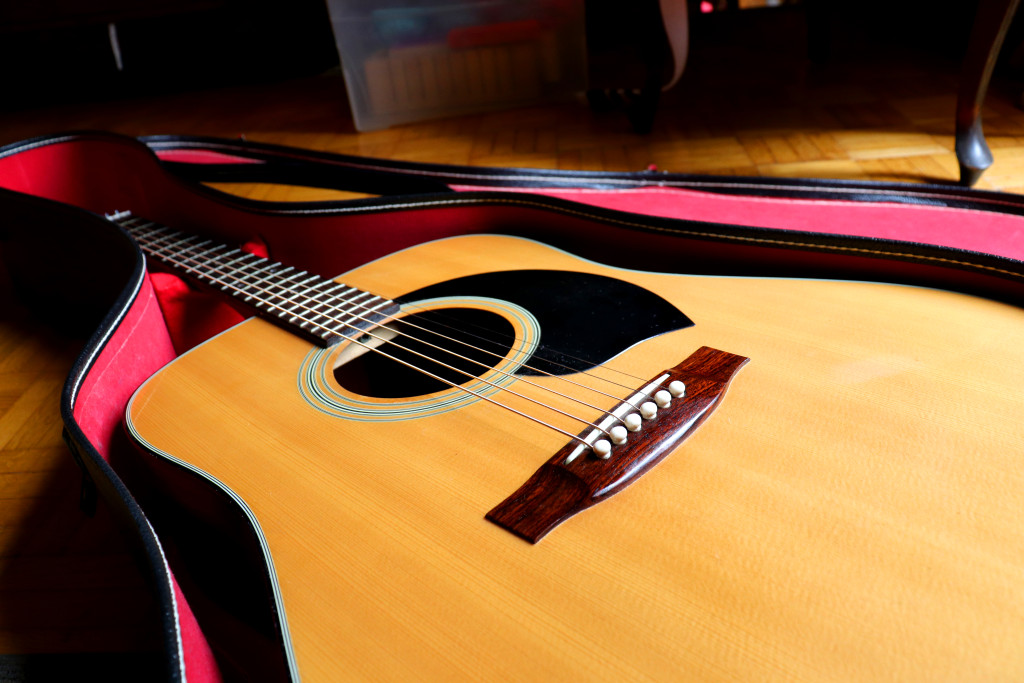
Storing woodwind instruments
For woodwinds like saxophones, flutes, or clarinets, make sure you place tissue paper between the pads of the instruments. This prevents pads from getting sticky. Take apart any reeds or mouthpieces, and don’t leave straps on instruments. Any instruments that can be broken into sections should be separated to prevent pressure on the joints. Instruments should be cleaned before being stored with a clean cloth and a vacuum to remove dust. When cleaning any instrument, be sure to use the right tools for the job and avoid household cleaners, which can be incredibly damaging. Special cleaning cloths can be found in most music stores.
Storing stringed instruments
Make sure to loosen strings and bow hairs to prevent them from expanding and contracting during storage. Even though they may be in a self-storage unit, it’s much easier to increase the tension on loose strings than it is to deal with an instrument whose neck has warped.
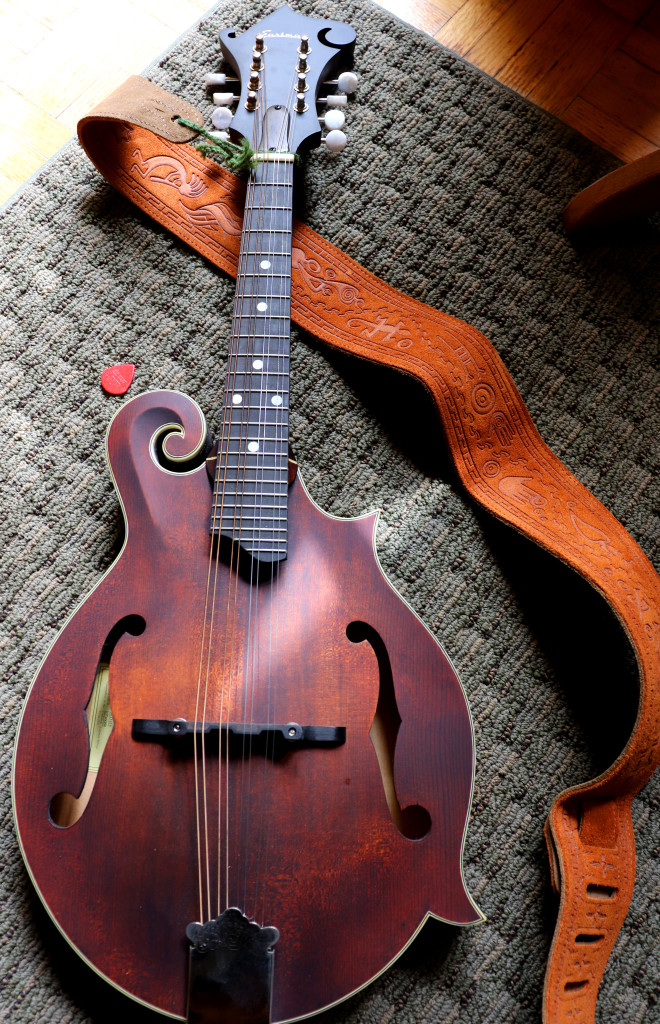
Storing drum sets and pianos
If you plan on storing your drum kit consider loosening the skins. This will help keep them from stretching and could postpone the need for replacement. Pianos, unlike other stringed instruments, don’t require string loosening, because they are designed to handle tons of pressure. You do want to wrap the legs, pedals, and bench of your piano in padding for protection. Covering pianos and drums with a tarp or sheet can keep them from getting too dusty.
Storing brass instruments
Before storing your brass instrument for an extended amount of time, disassemble it and remove the mouthpiece. Then clean, oil and polish the instrument to the best of your ability. You can use tissue paper in between the valves to keep them from sticking. In addition to cleaning the outside, you should thoroughly clean the inside of the instrument with an instrument cleaning brush. To prevent rust, brass instruments should be as dry as possible during storage. If you have time, let your instrument air out for a few days before storage, and ensure it’s free from all moisture before putting it into its case. As with every other instrument, avoid using household cleaners. If you don’t have access to specialized instrument cleaners, use water or a dry, lint-free cleaning cloth.
Consider insurance for your stored instruments
No matter how well you store your gear, there’s always the possibility that elements out of your control can cause damage to your instrument. If you’re storing something that’s borrowed or especially expensive, you may wish to consider purchasing insurance for your instrument. If you’re invested in your instrument and are taking extra precautions to ensure it’s in great condition when it comes out of musical instrument storage, insurance is the logical next step. It’s particularly a good idea if you have very valuable pieces of equipment, an instrument that’s been passed down through the generations, or a one-of-a-kind instrument. Many self-storage companies are insured, or offer insurance as a part of their packages. Review the contracts in full, and pay attention to the fine print, in order to understand what’s covered and what’s not. Sometimes, self-storage insurance is limited in nature, so you may still need to purchase your own.
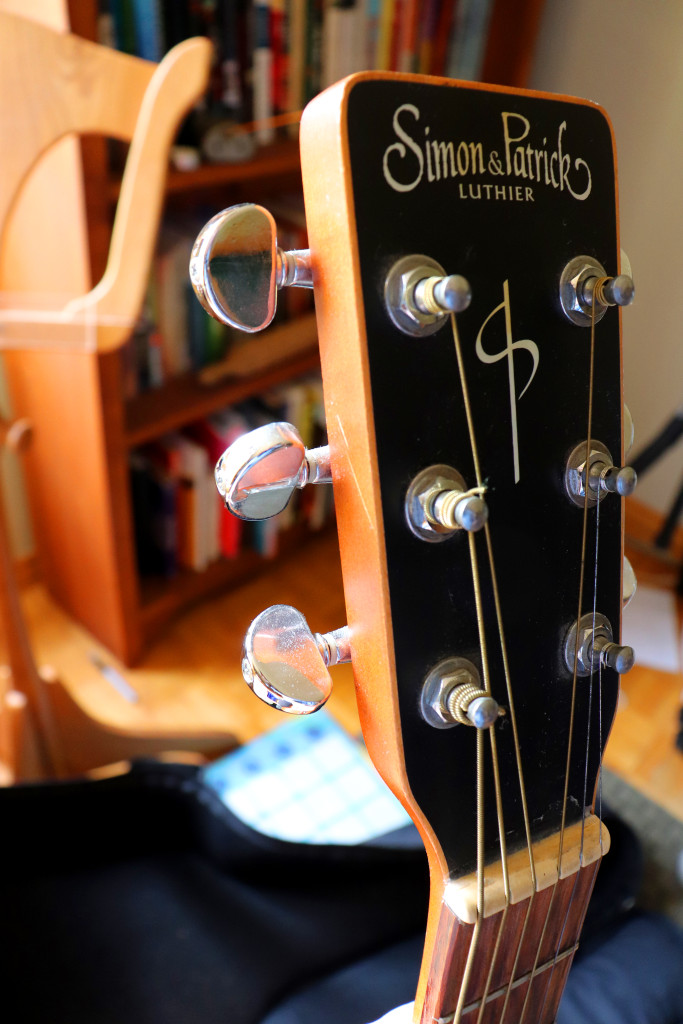
Store your musical instruments with Storwell
If you are pressed for space, you may want to use a self-storage facility for your musical instrument storage. Self-storage is a particularly good idea if you intend to store an instrument for a long period of time. Even if you have plenty of space in your home, if your house is not kept at the right temperature or if your home is too humid or too dry, your instrument can be damaged. Self-storage facilities like Storwell offer power ventilated units that will keep your musical instruments safe from fluctuating temperatures and humidity.
Storwell Self Storage is a great option for instrument storage; our facilities have state-of-the-art security features to ensure that our customers’ items are properly taken care of. Some of the security features include 24-hour video camera surveillance, pass code gate access, and individually alarmed units. Unlike other facilities, Storwell gives you 24-hour access to your unit so that you can check on your instruments at any time.
FAQs
Where should musical instruments be stored?
While musical instruments can be stored at home in a closet, attic, basement, or garage, there are often a lot of variables that you will not be able to control in your home that could damage your instrument. The main factor to consider when storing a musical instrument is temperature and humidity. Musical instruments should be stored at a temperature of 60° to 70°F (15° to 21°C) and a humidity level of 35-50%. A self-storage unit is the best place to store your instruments because it provides a safe, stable, and controlled environment where your instruments will be protected.
Do I have to keep my instrument in its case?
Musical instruments are expensive items. Storing them in their original case or box will help maintain their value. If you do not have the original box, consider purchasing one from a music store. Many instrument cases are lined and designed to fit the instrument precisely. This protects each piece from getting scratched or damaged.
Do I need insurance for my musical instruments in storage?
Musical instruments can be extremely expensive so you might want to consider purchasing insurance for your instrument. If you’re invested in your instrument and are taking extra precautions to ensure it’s in great condition when it comes out of musical instrument storage, insurance is the logical next step.
What size storage unit do I need for instrument storage?
The storage unit size you decide to rent depends on the particular instrument or instruments you want to store. If you are only looking to store one or two guitars, a 3×8 or 5×5 storage unit should be sufficient. However, if you are looking to store the instruments for a full band, you might need to go up to a 10×10 or 10×15 storage unit. If you are uncertain about what storage unit is best for your needs, consult with one of our experienced storage experts.
Where can I find a self-storage unit for my musical instrument?
Storwell Self Storage has a wide variety of storage unit sizes that can accommodate all kinds of musical instruments. Storwell has premium self-storage facilities across the GTA in Scarborough near Markham Road and Highway 401, in Etobicoke near Kipling Avenue and the Gardiner Expressway, and in Mississauga near Winston Churchill Boulevard and the Queen Elizabeth Way.



